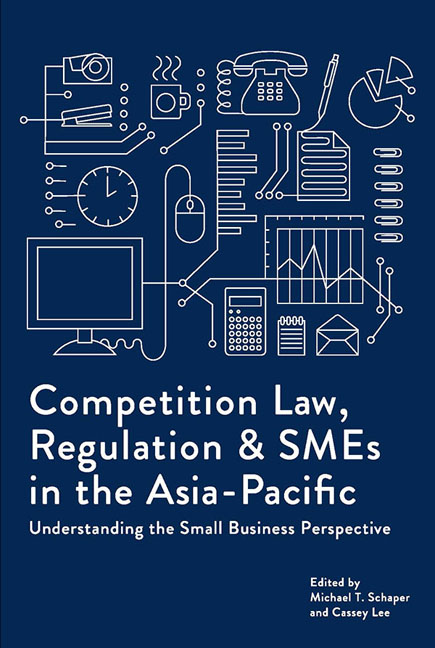 Competition Law, Regulation and SMEs in the Asia-Pacific
Competition Law, Regulation and SMEs in the Asia-Pacific Book contents
- Frontmatter
- Contents
- Foreword
- About the Contributors
- 1 Introduction: Making the Invisible SME More Visible in Competition Policy and Law
- Section 1 Theories And Basic Concepts
- 2 Smes, Competition Law, and Economic Growth
- 3 Competition Policy and Sme Policy: Strange Bedfellows?
- 4 The Competitive Experience of Uk Smes: Fair and Unfair
- 5 Competition Regulator Engagement with the Small Business Sector
- 6 Developing Online Competition Law Education Tools for Smes
- Section 2 Smes And Competition Law
- Section 3 Country Studies
- Index
5 - Competition Regulator Engagement with the Small Business Sector
from Section 1 - Theories And Basic Concepts
Published online by Cambridge University Press: 05 August 2017
- Frontmatter
- Contents
- Foreword
- About the Contributors
- 1 Introduction: Making the Invisible SME More Visible in Competition Policy and Law
- Section 1 Theories And Basic Concepts
- 2 Smes, Competition Law, and Economic Growth
- 3 Competition Policy and Sme Policy: Strange Bedfellows?
- 4 The Competitive Experience of Uk Smes: Fair and Unfair
- 5 Competition Regulator Engagement with the Small Business Sector
- 6 Developing Online Competition Law Education Tools for Smes
- Section 2 Smes And Competition Law
- Section 3 Country Studies
- Index
Summary
What constitutes “best practice” in terms of the interaction that a competition agency has with its own national small business constituency? This chapter discusses what “engagement” is, provides an overview of the general concepts and issues involved in developing an engagement framework, and examines some of the actual tools used in engagement, with a specific focus on Australian examples.
Small businesses can be both the victims of anti-competitive practices and the perpetrators of offences against consumers. Engagement by competition regulators with small businesses is both about their rights and their responsibilities, but should these be approached separately or holistically?
Research suggests that regulators often wish to act in certain ways to deliver upon their regulator objectives but find that statute law either prohibits or fails to facilitate sound engagement approaches. Discretion, though, must be weighed against predictability, transparency, and accountability. The approaches to the issue of discretion taken by different nations, and how this relates to small businesses are examined.
Introduction
Despite a plethora of inquiries into regulatory burdens, good regulatory design, and the regulatory circumstances in many industries and across a wide range of countries, little attention has been paid to how regulators interact with businesses, especially small ones. Yet this is critical, as the Queensland Chamber of Commerce and Industry of Australia noted:
“… in many cases it is the approach of regulators — their communication, advice and support, enforcement and reporting requirements — that have the most significant impact on business owner[s]” (PC 2013, p. 37).
The characteristics of small businesses can warrant a different approach to engagement by regulators, including by agencies tasked with promoting competition and consumer protection. As noted by the Council of Small Business Organisations of Australia (COSBOA):
… The previous [Australian Competition and Consumer Commission (ACCC)] chairman showed good skills and abilities in communicating with large businesses, but in our view he showed no understanding in how to communicate with the small business community. He did not understand the difference between big and small business, indeed we always felt that he demanded that small business have the same skills and abilities as big business (COSBOA 2013, p. 5).
Although the competition law obligations of businesses vary between countries, the scope of matters that can attract the attention of competition regulators is always narrower for small businesses.
- Type
- Chapter
- Information
- Competition Law, Regulation and SMEs in the Asia-PacificUnderstanding the Small Business Perspective, pp. 85 - 102Publisher: ISEAS–Yusof Ishak InstitutePrint publication year: 2016


